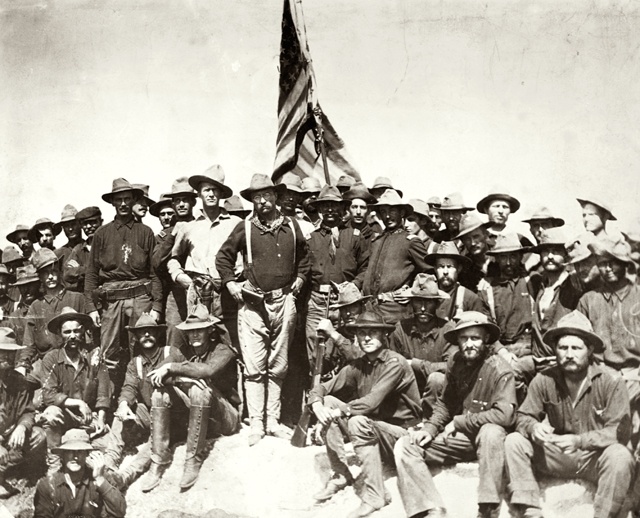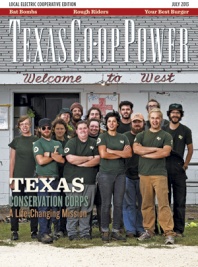When the Spanish-American War began in 1898, Theodore Roosevelt set out to recruit and train the 1st U.S. Volunteer Cavalry Regiment, later christened the “Rough Riders,” a force with which he planned to conquer the Spanish army in Cuba.
Already annoyed by Spain’s colonial empire just off American shores, U.S. citizens were outraged by the hunger, disease and rumored atrocities visited upon the oppressed Cuban population under Spanish rule.
When the USS Maine battleship exploded in Havana Harbor under mysterious circumstances, Congress voted to go to war. Roosevelt resigned his position as assistant secretary of the Navy and called for recruits to fight in Cuba. He was deluged with applications.
Born in New York City, the second child of wealthy importer and philanthropist Theodore Roosevelt Sr., young Theodore entered politics after graduation from Harvard. In his book, The Boys of ’98: Theodore Roosevelt and the Rough Riders (Forge Books, 1999), Dale L. Walker suggests that Roosevelt’s passion for war stemmed from embarrassment that his own father had avoided service in the Civil War by hiring someone to take his place.
Whatever his motivation, the younger Roosevelt had an inexhaustible supply of nervous energy and charged through life at the pace of a stampeding steed.
Roosevelt had always loved the outdoors and admired the toughness of the cowboys who accompanied him on buffalo and javelina hunts. Their relentless teasing (the cowboys called him four-eyes because of his wire-rimmed glasses and poked fun at his Harvard language when he shouted, “Hasten forward quickly there”) only made him more determined to outride and outshoot these hard-twisted men.
The war raged for 113 days in the spring and summer of 1898. Twenty-three thousand men responded to the call for a volunteer cavalry, among them cowboys, Native Americans, Ivy League athletes, heirs of Crockett and Tiffany, and New York policemen. “They must be as utterly reckless a set of desperados as ever sat in the saddle,” Roosevelt declared, and he chose with great care. An alarming number of inappropriate volunteers were diplomatically weeded out, including Buffalo Bill Cody, prizefighters James J. Corbett and Bob Fitzsimmons, Frank James, brother of Jesse James, and 600 Sioux Indians.
“We drew a great many recruits from Texas; and from nowhere did we get a higher average,” Roosevelt said, “for many of them had served in that famous body of frontier fighters, the Texas Rangers. Of course, these rangers needed no teaching. They were already trained to obey and to take responsibility.”
Volunteers from Arizona, New Mexico and Indian Territory joined the Texans near San Antonio at Camp Wood. Now called Roosevelt Park and located just off Interstate 10 near central San Antonio, the camp was a flat, grassy plain decorated with hoofprints and wedge-shaped tents set up beside a grove of cottonwood trees. Here, Roosevelt would shape the motley crew of ragtag recruits into an unstoppable fighting force.
Daily training began at 5:30 a.m. Roll call, stable call and breakfast preceded morning mounted drills during which close to 1,200 troops thundered across the plains in ragged formation, nearly obscured by clouds of dust. After supper, taps sounded, and a silent exodus began in the darkness as a fair number of the Rough Riders (a name given to the group by admiring newspaper reporters) crept away to the saloons of San Antonio.
On May 29, 1898, the Rough Riders traveled by train to Tampa, Florida. Their leader declared that they were so well prepared they could “whip Caesar’s Tenth Legion,” but then it was announced that only the horses of senior officers—and about half of the Rough Riders—would be put aboard the transport ships because of lack of space.
Roosevelt’s favorite horse, Little Texas, led the charge in Cuba during the Battle of San Juan Hill, but the Rough Riders followed on foot and took heavy casualties. About 25 percent of the regiment fell.
When word of the courageous charge reached U.S. shores and Spain was cast out of Cuba, Roosevelt became a popular hero whose political career charged ahead as well. “Roosevelt is an entertaining performer and a man to watch,” the Boston Globe reported, “but it would never do to permit such a man to get into the presidency. He would produce national insomnia.”
The words were prophetic. As president, Roosevelt would lead the United States more actively into world affairs guided by his favorite proverb, “Speak softly and carry a big stick.”
——————–
Martha Deeringer is a regular contributor.


